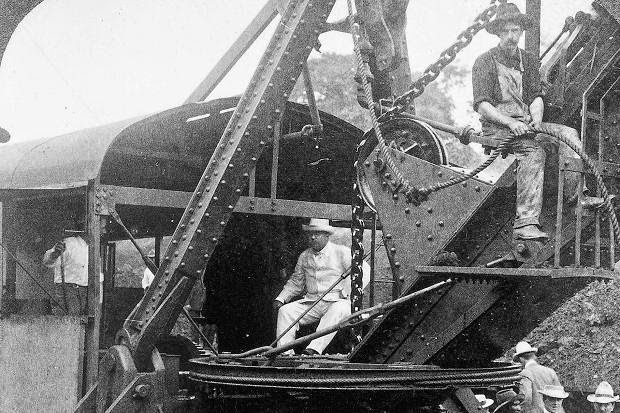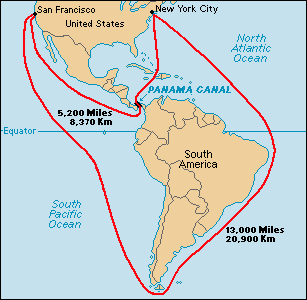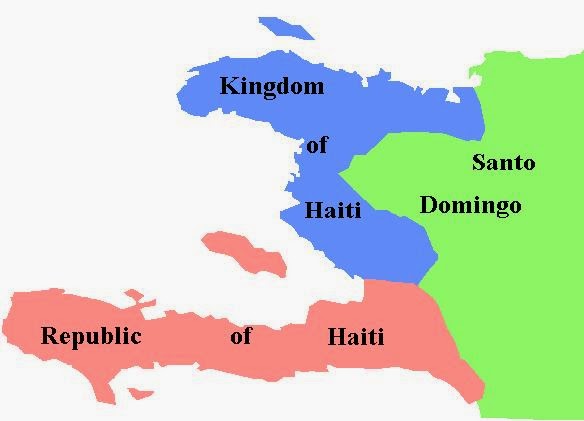Read this entry on United Fruit from Wikipedia. What does it tell you about United Fruit in general? About US foreign policy in the region? Does it amount to imperialism or not?
This 1950s short film reflects the spirit of the American view of the region.
President Roosevelt and the Panama Canal
What drove Roosevelt to make the construction of the Panama Canal happen?
Background items
- French plan for more direct global navigation
- Panamanian independence movement from Colombia

Through the construction of the Panama Canal and the influence of American business in Central America, the United States in the early 20th Century developed an imperial presence in the Caribbean region. That presence was, in some ways, even more apparent elsewhere.
Haiti (Corresponding text found on p216-222 and p263-268 in Brief History of the Caribbean.)
After securing independence, Haiti was ruled my the iron-fisted Jean-Jacques Dessalines
State owned plantations (2/3 of total); forced labor on specific plantation enforced by military
Dessalines ruled as Emperor 1805-Oct 1806
 |
| Jean-Jacques Dessalines |
Henri Christophe considered himself successor
New Constitution created powerful head of national assembly and powerless President
Assembly appoints Christophe President and Alexandre Petion head of National Assembly
 |
| Henri Christophe |
Clash of supporters and split - The Kingdom of the North and The Republic (1807-1820)
King Henri I - creates essentially feudal system; 'prosperous' due to export of agricultural goods
Brutal rule leads to revolt in 1820; King Henri shot himself at his mountain palace (w/ silver bullet?)
 |
| Christophe's Citadel |
Petion's Republic further breaks up plantations into smaller units divided among the people
Free people refuse to grow cash crops; prefer subsistence farming
Agriculture (and government) revenues start to dry up but people love Petion
Petion succeeded by Jean-Pierre Boyer in 1818 as President for life ; reunites Haiti in 1820
1822 - Haitian forces invade and control Spanish Hispaniola until 1843 (relative peace & stability)
1825 - France recognizes independence in exchange for compensation of expropriated planters
Perennially bankrupt government invests nothing in infrastructure or education (Catholic schools don't show up until 1860)
Lack of formal, functional government institution; politics of personality and family
Haiti develops something of a caste system
- colored Haitians: political power, control commerce, live on coast
- black Haitians: control army, peasant farmers, rural interior
1843 - revolution against Boyer
Next 72 years saw 22 different Heads of State (note description of turmoil on p220-221)
Divide in Haiti grows between black/colored and north/south
Europeans come to dominate Haitian economy; French buy most coffee and half of exports; Germans companies control trade
(Note dynamics of Haitian/Dominican Republic relationship on p221-222)
1915-1934 - US military occupies Haiti
 |
| US troops in Haiti - 1915 |
Occupation began due to President Wilson's fear of European invasion of Haiti
Placed government and finances under American control, abolished army , and created new police force (Gendarmerie)
Force adoption of new Constitution in 1917 which allows for foreign property ownership and only the Gendarmerie
US forces conscripted Haitians to construct roads for 3 days a year; Gendarmerie abuse system; US abolishes system in 1918
1922-1930 - US General John Russell coordinates all Haitian government actions with US government approved of President Louis Borno
Russell-Borno 'dictatorship' stabilized economy, built roads and bridges, telephones, wharves, schools
Marines imposed 'Jim Crow' style laws
1929 - civil insurrection leads President Hoover to desire withdrawal from Haiti
1930 - Borno ousted and new elections create new National Assembly
American withdrawal starts quickly; complete by 1934
Gendarmerie becomes new Garde d'Haiti under Haitian officers
Political power now consolidated in Port-au-Prince










No comments:
Post a Comment
Note: Only a member of this blog may post a comment.